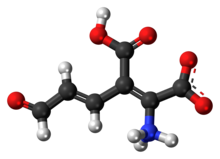2-Amino-3-carboxymuconic semialdehyde[1][2] is an intermediate in the metabolism of tryptophan in the tryptophan-niacin catabolic pathway. Quinolinate is a neurotoxin formed nonenzymatically from 2-amino-3-carboxymuconic semialdehyde in mammalian tissues. 2-Amino-3-carboxymuconic semialdehyde is enzymatically converted to 2-aminomuconate via 2-aminomuconic semialdehyde.

| |

| |
| Names | |
|---|---|
| Preferred IUPAC name
(2Z)-2-Amino-3-[(1Z)-3-oxoprop-1-en-1-yl]but-2-enedioic acid | |
| Identifiers | |
3D model (JSmol)
|
|
| ChEBI | |
| ChemSpider | |
PubChem CID
|
|
CompTox Dashboard (EPA)
|
|
| |
| |
| Properties | |
| C7H7NO5 | |
| Molar mass | 185.13 g/mol |
| Density | 1.527 g/mL |
| Boiling point | 389 °C (732 °F; 662 K) |
| Hazards | |
| Flash point | 189 °C (372 °F; 462 K) |
Except where otherwise noted, data are given for materials in their standard state (at 25 °C [77 °F], 100 kPa).
| |
References
edit- ^ "UniProt". www.uniprot.org. Retrieved 2022-11-22.
- ^ "Human Metabolome Database: Showing metabocard for 2-Amino-3-carboxymuconic acid semialdehyde (HMDB0001330)". hmdb.ca. Retrieved 2022-11-22.